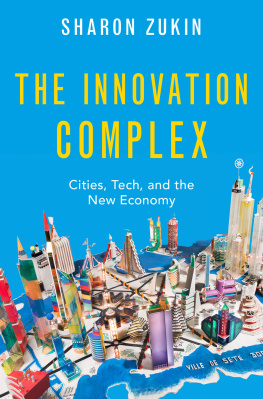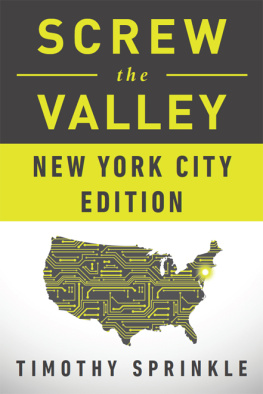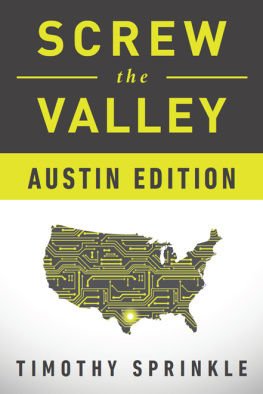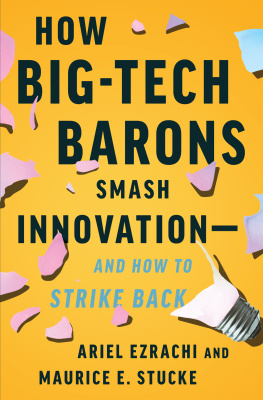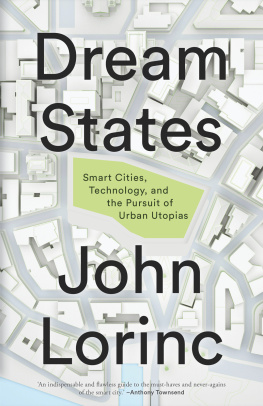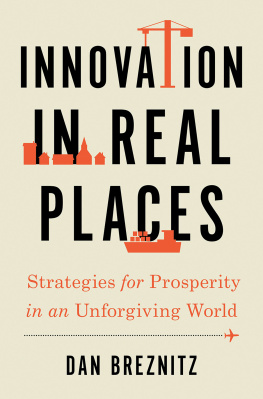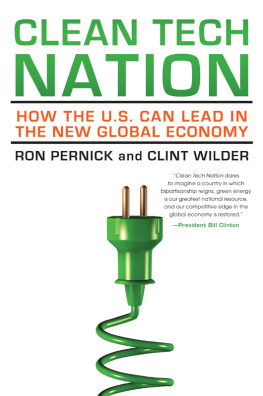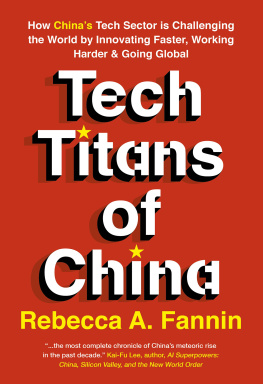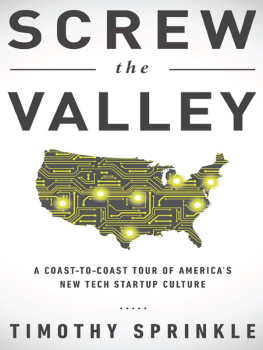The Innovation Complex

Oxford University Press is a department of the University of Oxford. It furthers the Universitys objective of excellence in research, scholarship, and education by publishing worldwide. Oxford is a registered trade mark of Oxford University Press in the UK and certain other countries.
Published in the United States of America by Oxford University Press
198 Madison Avenue, New York, NY 10016, United States of America.
Oxford University Press 2020
All rights reserved. No part of this publication may be reproduced, stored in a retrieval system, or transmitted, in any form or by any means, without the prior permission in writing of Oxford University Press, or as expressly permitted by law, by license, or under terms agreed with the appropriate reproduction rights organization. Inquiries concerning reproduction outside the scope of the above should be sent to the Rights Department, Oxford University Press, at the address above.
You must not circulate this work in any other form and you must impose this same condition on any acquirer.
CIP data is on file at the Library of Congress
ISBN 9780190083830
eISBN 9780190083854
Contents
Everyone talks about the innovation economy, but no one knows exactly where it begins. If innovation means new businesses and new ways of working that depend on digital technology, we can trace its origins to mid-twentieth-century centers of research and electronics production like Californias Silicon Valley and Route 128 in Boston. But if we want to know about the current era of platform capitalism, we look for innovation in new centers of software development in every big city of the world, beginning with San Francisco, New York, London, and Shanghai. Moral judgments also shape our search. Although critics of the new economy are outraged by precarious labor and digital surveillance, people who work within the self-styled tech community prefer an aspirational discourse of innovation and entrepreneurship. Yet one thing is sure despite contrasting views. Cities today are crucial sites for both the creation ofand resistance toa powerful interplay of land, labor, culture, and capital that forms the base of the new economy: the innovation complex.
As this phrase implies, the new economy has material as well as symbolic dimensions. On the material side, city leaders build multiple sites or complexes of buildings for technological
The reality is riskier and more complex. Under the radar, the city government plays a major role. It subsidizes business investment and specialized education so that tech companies will create jobs. It sets up tech hubs and innovation districts for real estate developers to thrive. And it deals with tech-related disruptions in local markets and communities: ride-hailing services and short-term housing rentals, self-driving cars and electric scooters, and collection of private data by companies that offer smart city gear. Even if they try to ride the tiger of digital innovation, mayors are held in thrall by a larger context: the reshaping of global capitalism.
To see how this works, look at The Grid, one of many initiatives the New York City Economic Development Corporation (NYCEDC) has taken in recent years. Like other partnership networks, The Grid sets up a working relationship between private-sector tech companies, tech teams in city government, and nonprofit organizations, including local universities, economic development corporations, and business improvement districts. This diverse array of organizations aims to share knowledge and forge innovation; along the way, it will save the city and the world from both economic and environmental disaster. Yet clearly each partner hopes to gain something from the arrangement: investment capital, procurement or training contracts, or jobs.
Now, look at Jeff Merritt, a member of The Grids steering committee. The photo on his website shows a youngish guy with a fashionable amount of light brown stubble. Merritts background is in the field called civic tech; he has worked on projects for citizens participation and democratic governance with governmental agencies and nongovernmental organizations in the United States and overseas. In 2010 he took a job with the current mayor of New York City, Bill de Blasio, when he held the office of public advocate. After de Blasio was elected mayor in 2012, he appointed Merritt the citys director of innovation. In that position, Merritt helped to establish the Mayors Office of Technology and Innovation. He then moved to his current job as head of IoT + Smart Cities at the World Economic Forum. This is the organization that hosts the highly publicized, annual conferences at Davos for A-list heads of corporations, governments, and research institutions from around the globe.
These seemingly trivial facts indicate a stunning reality: local lives and fortunes are inextricably linked to global capital. You see this best in big cities like New York that have emerged as superstar cities, centers of the new economy. In these cities, startups bloom, jobs of the future multiply, and a meritocracy trained in digital technology, backed by investors who control deep pools of capital, forms a new, tech-financial elite. But you must know where to look for it. Significant individuals whose names you dont know and events youve never heard of are claiming influence, forging the rules, and shaping the mindset of a young generation. Jeff Merritts presence on the steering committee of The Grid helps to connect New Yorks innovation complex to the CEOs and organizational leaders of the World Economic Forum.
This connection may remind you of the power elite, the term coined by the mid-twentieth-century sociologist C. Wright Mills to describe a new, unified structure of individuals at the top of business corporations, government, and the militarya structure broader in scope, more deeply embedded in national institutions, and more powerful than any local rulers and influencers in history. For Mills, the power elite that developed in the 1950s, after World War II, responded to the risks of all-out nuclear war and the riches of national markets. Today, a similar elite, based in the ranks of the tech industry and among financial investors, responds to the risks of all-out economic competition and the riches of global markets. Operating through public-private-nonprofit partnerships like The Grid, a tech-financial-governmental elite and its related meritocracy are remaking cities for a new age of global capital.
I admit this is a more polemical vision of the new economy than most accounts offer. On the one hand, economists and geographers map a new geography of jobs that concentrates a small number of highly paid jobs for highly qualified professionals in a few superstar cities. On the other hand, sociologists and business experts who study innovation focus on processes of informal social networking between organizations that eventually results in marketable products and ideas. Both approaches emphasize the apparently determining role of tech talentyoung, mobile, educated laborwho now want to live and work in cities, a cultural choice that has brought us food halls, bike lanes, and coworking spaces, universal signifiers of the innovation complex, as well as New York City branches of Google, Facebook,
I would not deny that cultural choicesaspirations, tastes, aesthetic dispositionshave magnified the growing appeal of the new economy and shaped the narratives that it promotes.

